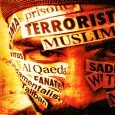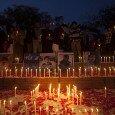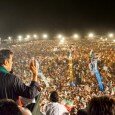By Shahzad Raza –
Religious bigotry and intolerance in Pakistan have defaced our national character
In mid-80s we used to watch Qari Khushi Muhammad teaching Nazrah on state television. Those were the days when remote control was merely used to increase or decrease the volume, not to surf through hundreds of satellite channels. Sunnis used to facilitate their Shia neighbours during Moharram. Kids had their fun too over sweet milk while watching chest-beating mourners in narrow alleys and big squares.
The seeds of Zia-sponsored religious hatred had not yet germinated.
Fast Forward to 2014
The televangelists, hate-mongers, misogynists and pseudo-intellectuals rule the roost. The likes of Amir Liaquat and Junaid Jamshed are our modern-day redeemers. The local clerics believe they can beat Farid Zakaria and David Ignatius when they start discussing foreign policy issues in their sermons. Normally, their sermons begin by praising Allah Almighty and end somewhere cursing Israel, America and India.
The Sunni-Shia sectarian war has also evolved over the years. Its tentacles can be found in Tehran, Riyadh and beyond. The sectarian killings continue across the country with impunity. The banned sectarian outfits never cease to operate. They surface under different nomenclatures since their operation networks are never destroyed. Thousands of seminaries in every nook and corner are incubators for terror and sectarian outfits.
Recently, a court ordered the government to lift ban on proscribed Sipah-e-Sahaba and Sipah Mohammad – two sectarian outfits which were banned by General Musharraf regime. The lifting of ban is merely symbolic, as both outfits have been operating under different names.
The Pakistan Telecommunication Authority (PTA) blocked countless porn and anti-Pakistan websites. Might one ask why did the authority never block websites containing sectarian hatred? And how on earth should one buy the argument that the ban on YouTube could not be lifted because it would hurt the sentiments of Muslims, in general.
Specter of Sectarianism
With ever growing intolerance the threats of sectarian violence are very high in the society. Miraculously, the holy month of Moharram has passed without any untoward incident. In 2013, the city of Rawalpindi was up in flames when sectarian violence broke out on 10th of Moharram. People were killed, religious places were torched and army troops were called to control the situation.
When I visited a burnt Imambargah, I got some memorable sound-bytes. Sunni neighbours volunteered to talk and with no hesitation express solidarity with their Shia brothers and sisters. That, I believed, was the true spirit the Rawalians still have. However, a handful of spoilers are enough to destroy the sectarian harmony. And the news hungry media add fuel to fire.
Prominent sectarian leaders have countless cases registered against them, yet the authorities are helpless to arrest them. They fear their arrest may spark violence, beyond the control of the law enforcement agencies.
Army Chief Gen Raheel Sharif repeatedly asserted that indiscriminate action would be taken against all terrorists. Neither the army chief nor any government functionary has categorically spoken against the sectarian elements. Apparently, there is no strategy to deal with this immediate threat. The best policy the civil law enforcement agencies have adopted is to wear them out.
Blasphemy
Recently, Asiya Bibi, a Christian woman accused of committing blasphemy, appealed to the government to pardon her for the crime, she insisted, she never committed. While defending her in 2011, then Punjab Governor Salman Taseer lost his life. The killer, his own security guard, was garlanded, hailed, and presented as a national hero by many.
When Gen Zia introduced blasphemy laws – an alternate version of colonial laws – he set the stage of state-sponsored persecution. Independent estimates show more than 1,000 people are currently in jails facing blasphemy charges.
Alama Tahir Ashrafi, chairman of Pakistan Ulema Council, made a wonderful suggestion. He discouraged the media-hype whenever someone is accused of blasphemy. He said someone being accused of blasphemy must not be misunderstood as someone who had actually committed the crime. “Unless the competent courts declare him or her the blasphemer, no one has the authority to harm him or her in any way,” he argued.
The terrible incidents of Gojra, Joseph Colony and Kot Radha Kishan are some of the examples where mobsters trampled every norm of civility.
Mufti Naeem of Jamia Naeemia agreed that Islam strictly prohibits harming anyone accused of blasphemy, without giving them chance to defend themselves before the courts. “And only state can punish the blasphemers. But when state institutions fail to act in time, the people resort to violence given sensitivity of the issue,” he observed.
It is fair to ask whether we have become a nation of hypersensitive people? The virtues of tolerance, forgiveness and compassion have long lost. We closely monitor others’ actions and words in order to use against them.
Televangelists
Little knowledge is dangerous – the phrase taught to pupils in early schooling. There is no rocket science to predict the results, if a Cessna pilot tries to fly F-16 or a cabby replaces Michael Schumacher.
Recently, a televangelist incurred wrath of religious right after he made objectionable remarks about a holy figure. The clerics went berserk. They denounced him in harshest words. Several FIRs were registered and the anchorperson had to leave Pakistan after issuing public apology in a video message.
Since religious entertainment attracts sizeable number of eyeballs, the TV anchors with little or no knowledge of religion tend to tread in these treacherous terrains. And the result: several them and their employers are now facing blasphemy related cases.
The debate is confined to their conduct and mistakes. Hardly any one is talking about solutions or regulations. So should we revert to Qari Khushi Muhammad style of religious programming? Or should the televangelists be extra careful and more knowledgeable before making their thoughts known to the general public?
Shahzad Raza is an Islamabad-based journalist. He tweets @shahzadrez































































































